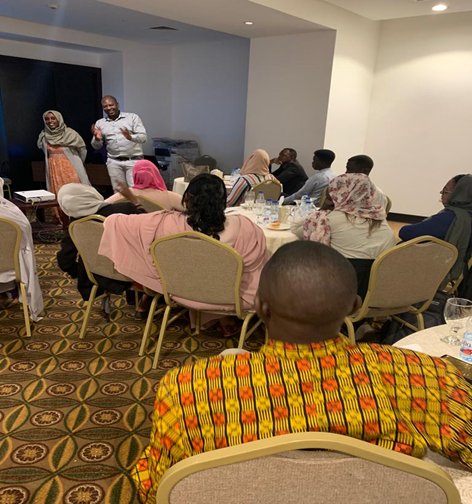Putting Local Partners in the Monitoring, Evaluation, and Learning (MEL) Driver’s Seat

For nearly four decades, the International Republican Institute (IRI) has worked with thousands of local partners to advance democracy worldwide. This has given IRI a unique opportunity to appreciate these partners’ roles and design stronger monitoring, evaluation, and learning (MEL) systems that meet both funders’ requirements and local partners’ learning and decision-making needs. Below are some of the lessons learned from IRI’s Africa programs:
- Connect MEL to the Big Picture
Occasionally, partners are not aware that the MEL data they collect may inform policies at the national and international levels. For example, some partner data contributes to the Performance Plan and Report (PPR) Indicators — an annual data call where all US Department of State and United States Agency for International Development (USAID) Operating Units (OUs) that receive foreign assistance funds report on results achieved in the past fiscal year to the US Congress. IRI has learned that communicating the bigger picture to local partners increases their buy-in to prioritize MEL data collection and improves their awareness of the value of the data they generate. IRI works with local partners to inform them about their contributions to the overall program goals, Theory of Change, and the funder’s strategic objectives.
- MEL Requirements are not Universal
Most local partners have worked with multiple funders, which have different MEL requirements, protocols, and systems ranging from terminologies to templates. For example, the United States Agency for International Development (USAID) defines youth as individuals aged 10-29 but can recognize youth up to age 35 depending on country context. The United Nations (UN) defines youth as individuals between 15-24 years old, and each country’s definition varies. It is important to communicate the funder’s MEL expectations and requirements and provide guidance to local partners prior to program implementation. Accordingly, for new programs, we recommend program teams conduct a MEL kickoff meeting with local partners to communicate funder-specific requirements. This encourages partners to align their MEL systems to these requirements.
- Prioritize MEL for Learning
While using MEL for accountability is important, it should not come at the expense of learning. One should not reduce local partners’ role to data collectors with no or minimal opportunity to reflect, analyze, and make decisions based on the collected data. In such cases, data becomes less meaningful and is perceived as an additional burden and irrelevant to local partners’ needs. Recognizing this, IRI has supported local partners to utilize their data through reflection, learning, and adaptation sessions.
For instance, during the IRI-Zimbabwe partner reflection and learning session, partners observed that while most indicator targets were met, Persons with Disabilities (PWDs) and youth were not participating in program activities as expected. To address this, partners adopted social media tailored to such groups and adapted program activities to better include these marginalized groups. In addition, verifying local partner data by conducting routine data quality checks can be valuable to improve data quality. However, for these checks to be meaningful, they should be designed and implemented as a learning opportunity rather than a fault-finding mission.
- Avoid Assumptions about Partners’ MEL Capacity
Sometimes, it is assumed that local partners have limited MEL capacity and should not be engaged in discussions about choosing best approaches to measure the program’s results. In other cases, it may be assumed that local partners already have the required capacities and do not need any support. Hence, the need to continuously strengthen partners’ MEL capacity, which should not be based on assumptions, but conversations with partners and evidence of their needs. IRI has successfully used the MEL capacity assessment to inform its partner of development initiatives.
IRI’s partners are key to achieving locally driven and sustainable results. To ensure that MEL is not seen by partners as an accountability-only mechanism that reinforces hierarchical relationships between funders and local stakeholders, IRI should work with them to codesign MEL systems. These systems should prioritize learning, meeting partners’ needs, and connecting MEL requirements to the bigger picture. IRI’s experience with programs in Africa have shown that these intentional strategies shift partners’ perceptions toward MEL and ultimately lead to more evidence-based programs.
Top